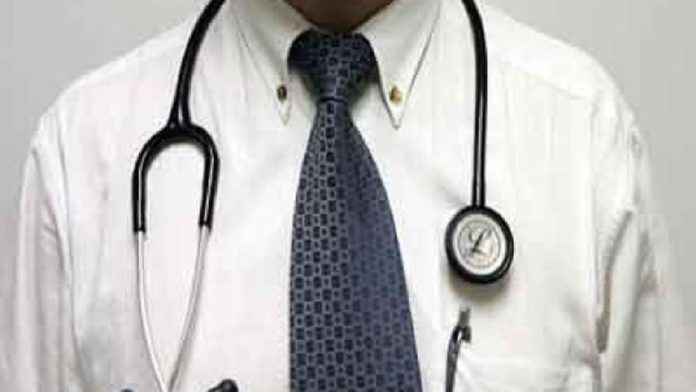A US-based Nigerian doctor on Saturday warned his fellow doctors to be circumspect about their protection routine.
The Nephrologist in Bronx, New York City (name withheld) contracted COVID-19 in the course of his job.
Nephrology is a specialty of medicine and pediatric medicine that concerns itself with the kidneys: the study of normal kidney function and kidney disease, the preservation of kidney health, and the treatment of kidney disease, from diet and medication to renal replacement therapy.
He recounted how he got infected during a ZOOM meeting with 20 other African medical practitioners.
According to him it all came about because of his unguarded examination of an asymptomatic patient using a face mask he had used more than once.
Coughing heavily as he spoke, he said: “When I came in contact with the patient I was wearing a surgical mask, gloves and apron.
“I had used the face mask about two to three days. I was careful not to touch the surface.
“I cannot remember if I washed my face after seeing the patient; I don’t know if it contributed to how I got the infection.”
He advised doctors to prepare ahead, “work with your family as if you are already exposed.”
“The day I confirmed I had COVID-19 I had done what I had to do on the home side.
“You can have all the PPE (personal protective equipment) there is; if you are taking it off and you don’t do it appropriately, you will run into trouble.
“Avoid touching surfaces; wash your hands; wash your face.”
The meeting which was anchored by Dr. Ona Utuama, a hospitalist and public health researcher practicing in the U.S. also drew participants from U.K, other parts of the US, South Africa, Ghana and Nigeria.
Among those who joined from Nigeria were the Special Adviser to the Anambra State Governor on Health, Dr Simeon Onyemachi; and Team Leader for COVID-19 response at the University of Benin Teaching Hospital (UBTH), Dr. Benson Okwara.
Dr. Utuama urged doctors to demand for PPE from hospital authorities rather than manage whatever inadequate equipment they are given.
“Ask your hospital to provide. If you are a health worker you need the best type of protection you can get,” he said.
A participant Dr. Anthony Nebor, speaking from Detroit, USA, advised doctors to limit their exposure while treating patients by going to them only when necessary as the virus spends substantial time in the air.
He said: “Studies have shown that this virus can be in the air for up to three hours. For the dreaded Tuberculosis it is about 30 minutes. If you don’t have adequate protection, you should not see patients,” he said.
Nebor added: “I stand for use of PPE once and discard. I am still a bit sceptical about disinfection,” he said.
The group generally agreed that Tele- medicine was a way hospitals could use to reduce face-to-face meetings with patients.
Dr Ufuoma Okotete, an Abuja-based physician, said Tele-Medicine was the way to go. “Sixty percent of hospital visits are not necessary,” she said.
However, Dr. Adegoke said hospitals have to work out how to bill patients for Tele-medicine which may not require the patient to be physically present at the hospital.
Dr. Utuama said she uses Tele-Medicine to attend to patients at the hospital.
“We started with using the phone; now we use an iPad to interact with the patients,” she said.
Regarding use of face masks by the public, the doctors agreed that it should become a general policy.
Dr. Utuama advised Nigerians to make masks at home to reduce cost of buying readymade ones which are presently scarce.
“We don’t have masks here; we are telling people to make. In Nigeria, let tailors make cheap face masks and give or sell to those around them. It took us five weeks to make that decision – too late. So for Nigeria, make that decision now,” she said.
Dr. Patricia Wodi, a pediatrician based in the UK, called for a policy that requires all patients to wear face mask when visiting the hospital.
She also warned doctors not to hang around the hospital longer than necessary and limit discussion with co-workers.
“The Italians had substantial transmission among his workers. Protect yourself; be wary of patients and other health workers. Every human being is a potential carrier,” she said.
A doctor from Ghana, Getrude, said doctors were being told to use home-made PPE.
In Anambra State, Dr. Onyemachi said private hospitals have been directed to set up mini-isolation areas in their hospitals should they get suspected cases then escalate to the relevant government agencies to pick up such patients to isolation centres. He said the state may get up to 7,000 cases based on its mathematical model, adding that the government had prepared a 300-plus bed isolation centre for COVID-19 cases in the Anambra State NYSC Camp.
“There is no case in Anambra. We are preparing for the worst case scenario. If we look at the modelling, we will get 7,000 people. We have built 328-bed isolation centre in the new NYSC camp. We set up protocol for hospitals to follow. When they get suspected cases, they should use a part of the hospital as mini-isolation centre; the numbers to call are in the bulk SMS we sent to the hospitals,” he said.







